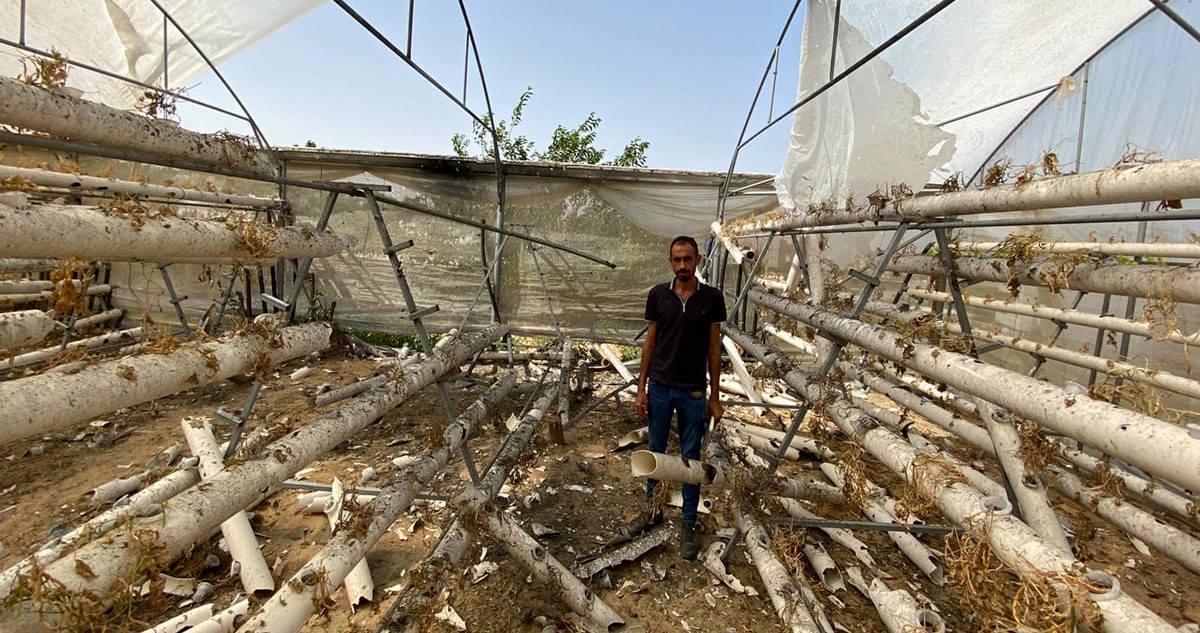Nearly four months after the outbreak of “Operation Guardian of the Walls,” Israel’s most extensive military operation against the Gaza Strip since 2014, the coastal enclave which is home to 2 million Palestinians, most of them refugees, is far from quite. According to the Israeli NGO Gisha, Gazans face a difficult recovery, amid additional airstrikes, and stalled reconstruction and repair of basic services, including water supply.” Gisha is an Israeli not-for-profit organization, founded in 2005 whose goal is to protect the freedom of movement of Palestinians, especially Gaza residents.

Prior to the military attacks of May, 2021, this hydroponic farm in Beit Lahia in the northern Gaza Strip was considered one of the most successful agricultural technology projects in the coastal enclave. Launched by Abdallah Abu Halima, the project relies on innovative water balancing technology. The area was hit during an air and artillery strike by the Israeli army in the area on May 19. (Photo: Gisha)
Following the offensive, Gaza quickly disappeared from the headlines, replaced by calamities and crises also deserving of the world’s attention. And yet, Gisha continued to report on unprecedented restrictions on movement blocking reconstruction and recovery, and undertook sustained advocacy vis-à-vis local and international decision-makers.
Gisha writes, “Our strategy contributed to a reversal in policy, with the Israeli authorities permitting some entry of goods for civilian infrastructure, and eventually for commerce and reconstruction. We brought to the courts cases of individuals blocked for travel due to egregious restrictions maintained since the start of the pandemic, leading to policy changes allowing for visits to sick relatives, attending funerals, and access to consular services for the first time since March 2020. In recent weeks, traders are also being permitted to exit Gaza for the first time since the pandemic began.”
On September 1, following changes implemented in recent weeks to Israel’s policy vis-à-vis access and movement to and from Gaza, Israel’s Coordinator of Government Activities in the Territories (COGAT) announced a number of additional steps, including:
- The “fishing zone” enforced by Israel in Gaza’s sea space was expanded to a maximal distance of 15 nautical miles in certain areas of the zone. The last time Israel allowed fishermen to access the sea at this distance was on April 26, 2021.
- The quota of trader permit holders has been expanded to 7,000 for the first time since Israel imposed the “coronavirus closure” at Erez Crossing in March 2020. Before March 2020, about 6,000 people in Gaza held valid trader permits.
- Additional restrictions imposed by Israel at Kerem Shalom Crossing since the military offensive in May 2021 have been reversed, including the ban on entry of construction materials. The commercial crossing has now returned to operate under the restrictions enforced until May.
In its most recent Crossing Update, Gisha goes on to write, “It is important to recall that even before May, the sweeping movement and access restrictions enforced by Israel constituted illegal collective punishment, leading to immense harm to Gaza’s economy and the everyday lives of its two million residents, half of them children. The removal of the additional restrictions enforced since May and the opening of Erez Crossing to movement of a small number of traders for the first time since March 2020 are crucial but insufficient, especially given the scope of the damage in Gaza, as well as Israel’s legal and moral obligations towards residents of the Strip. Israel must allow immediate access to all that is needed, not only for reconstruction but also for normal life, and allow travel of people subject only to relevant considerations.”
Related: Gisha’s most recent Crossing Update, September 1, 2021


